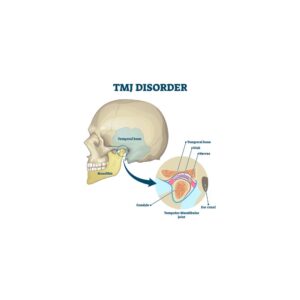TMJ Disorder in Houston, TX
TMJ can be treated through a variety of treatment options. If you experience jaw pain, there are ways to diagnose and treat it so you can live peacefully.
TMJ Treatment in Houston
If you experience an aching jaw, pain or tenderness in the jaw joints, or pain when chewing, you may have a Temporomandibular disorder (TMD). The most well-known TMD is Temporomandibular Joint Disorder (TMJ). The temporomandibular joint is the hinge that connects your jaw to your skull. It’s located right beneath the ears on both sides of the face.
For treatment of your TMJ, we will first discuss any risk factors that may be contributing to your pain. We’ll then do an examination that includes listening to your jaw, feeling it move, and pressing areas to determine where the pain is coming from. We will also take X-rays or 3D images. If we think it’s necessary, some patients need an MRI to see if the disk or soft tissues are damaged.

-
How do I know if I have TMJ?
There is no way to diagnose yourself, but there are common symptoms you can look for. If you have any of these symptoms and they don’t resolve on their own, you will need to see a dentist for an official diagnosis and treatment plan.
In most cases, jaw, ear, or facial pain is temporary and resolves on its own. However, if the pain is persistent and over-the-counter medications or home remedies no longer work, give us a call.
Common signs and symptoms include:
– Pain in your jaw
– Jaw is tender to the touch
– Ear pain
– You have pain while chewing
– Facial pain that you would describe as ‘achy’
– Locking of the jaw joint — getting stuck in an open or closed position
– Headaches -
What causes TMJ Disorder?
Often we can’t tell the exact cause of TMJ. Which can be frustrating for you and for us. However, there are several factors we can look for to see if any apply. Some of the common causes of TMJ can be erosion of the disk that is between the bones, or the disk can slip out of place. You might also have pain if you have arthritis in the jaw joint.
Trauma can also cause damage leading to chronic pain. Some people who grind their teeth at night are more prone to TMJ as are people who have high levels of stress. There may also be a genetic component to TMJ.
More Questions?
If you have more questions about TMJ Disorder, please contact our office and we will be happy to discuss further.
See All Dental Services Contact Pearl Shine Dental Request An Appointment

